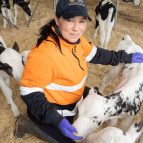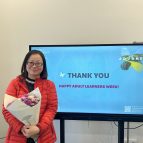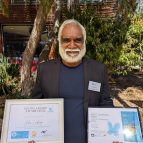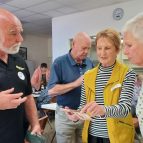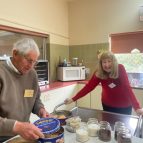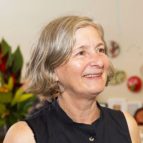No more waiting at Bus Stop
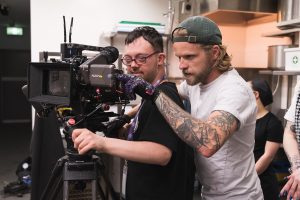
A film-making course is shifting attitudes about disability on and off screen.
Bus Stop Films, a not-for-profit organisation that teaches film-making to people with an intellectual disability to improve their participation and representation in the film industry, is running its Accessible Film Studies Program for the first time in Tasmania.
The Launceston program, run in partnership with TasTAFE, is Bus Stop Films’ tenth program, joining a network of programs in locations including Sydney, Brisbane, Adelaide, Melbourne, Parramatta, Canberra, and Wollongong.
Bus Stop Films Chief Executive Officer Tracey Corbin- Matchett says the 40-week course is a game-changer for the participants and the Australian film industry.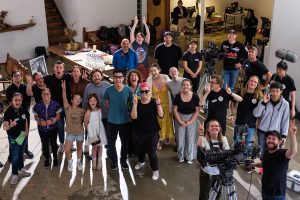
‘People with disabilities get a chance to see themselves on screen, have a chance to tell their own stories and the industry benefits by being more inclusive and representative of the diversity of Australian voices.’
‘A great film can really change attitudes. It can change lives and minds.’ Tracey Corbin-Matchett, CEO, Bus Stop Films
The program consists of three-hour weekly classes, delivered on Saturdays over 40 weeks at TasTAFE in Launceston. Program fees can be paid through a student’s NDIS package.
During the course all participants are involved in creating a short film and learn lighting, camera, sound, hair, makeup, production, sound design, and casting. They learn from professional film makers who work as mentors alongside them during film making as well as in post-production.
Mainstream educational institutions who partner with Bus Stop Films are showing their commitment to inclusivity and collaboration and their students benefit from being involved in an award-winning training program, Tracey says.
Bus Stop Films benefits through access to facilities and equipment. All films are shot in one day which costs around $15,000. ‘Panasonic provide the cameras so we are very grateful for that support but we aren’t eligible for film finance because it’s a film school production so we raise money through fundraising.’
The course does not offer a formal qualification. ‘We’re a social enterprise not an RTO,’ Tracey says. ‘It’s about developing our community and capacity building. There’s a whole bunch of things our students learn – taking direction, improving literacy, building relationships, and developing communication skills. They get all of this through the film school experience. It also helps them get work in the screen industry. They get attachments on feature films, they work on TV commercials and shows, and in production. The industry gains confidence in working with people with disability and people with disability gain confidence working in the industry.’
Changing film culture Tracey says that learning skills in film-making not only gives students better access to paid work opportunities in an industry that is experiencing a labour shortage but enables them to tell unique stories about life with a disability.
‘We want more people with disability on screen as well as behind the camera as crew, in the production office and as part of the writers’ room so that people who are underrepresented are part of the whole process.’
‘I love Bus Stop Films because it’s a perfect synthesis of creativity and social justice.’ Tracey Corbin-Matchett, CEO, Bus Stop Films
Bus Stop Films’ students have gone on to work on projects such as Marvel’s Thor: Love and Thunder, Masterchef and Survivor and the program has provided pathways to employment in the screen industry for over 1000 students.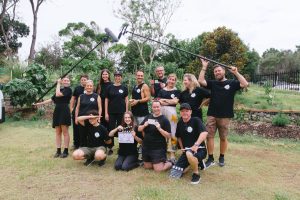
The tutor works as a film director with a group of up to 15 young adults living with an intellectual disability or who live with an Autism Spectrum Disorder to produce a short film.
‘I always say a good tutor is a unicorn, creative and kind. It’s a job that takes a lot of patience. You either love it or it’s not for you. We look for people who have a passion for film-making who lean towards social justice and who are very good at what they do.’
After they’ve finished the program some participants stay on working for Bus Stop Films, with most staying one to three years before going out into the industry.
A booming industry
Film production is thriving in Australia, Tracey says. ‘It’s going gangbusters. Major productions like The Fall Guy are choosing to shoot in Australia because we have these beautiful landscapes that lend themselves to looking like the US or anywhere else in the world. We have great crews, and amazing studios and overseas and domestic producers are chewing through content and we can hardly keep up with the demand.’
Still change is slow. ‘One of the things that struck me when I met founder Genevieve Clay-Smith was how the film industry was too good for too few. There’s so much work in production so why aren’t more people with disability employed in the sector? I want to grow Bus Stop Films and capitalise on its assets and partner with film schools to deliver courses because we don’t have enough courses for training baby film makers. Bus Stop Films offers them a great opportunity to get that experience.’
Read the full issue of Quest 2, 2023

